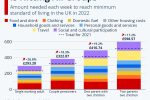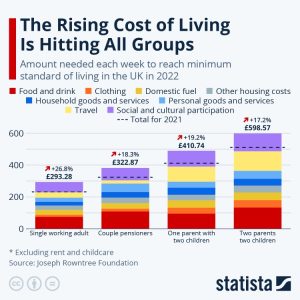The Poor Pay the Price

I vividly recall a mother at a meeting of MP election candidates challenging them over the levels of tax and benefits. One of the panel tried to brush her off declaring tax and benefits “so complicated it was a matter best left to financial experts”. She interjected tellingly; ” those of us who have to pay the price can do the arithmetic, why can’t you?”.
As nearly seven million households of the poorest people are already paying over the odds for basic food, goods and services, there is according to the Centre for Social Justice already a ” poverty premium” which costs families £480 a year for higher food, prices in supermarkets, higher interest costs on credit, and higher energy costs and that was before the recent autumn emergency budget announcements. What’s more, the pressure on the budgets of the poorest is a result of years of austerity as well as rising inflation. The Office of National statistics shows the price of budget food in supermarkets rising by 17% in the year to September. Nearly one in three lone parents (and 10% of lone parents use foodbanks), are reported as now skipping meals . NHS data reveals that in2021/2022, over 10,000 patients were so malnourished they needed hospital care, an increase over 3,700 the previous year. The Food Foundation charity reported recently that four million children were living in homes without adequate access to food. Furthermore, more and more are calling on overstretched foodbanks.
 Encouragingly, there was pressure to upgrade universal credit benefits in line with inflation and to be fair, despite the worst fears, the welfare budget was largely protected by the Chancellor’s decision to increase them by the current 10.1% inflation figure, though a week later inflation rose by another 1% and is now projected to rise further with more interest rises. As benefits and state pensions were generally protected, the budget deficit (largely the hole generated by the Truss and Kwarteng experiment) has been pushed forward into major national department cuts in the future(in the 2024 financial year). However, the pressure on local government has been increased. Local councils can raise more council tax but they are under pressure to provide more caring services, so they have to make cuts elsewhere, not least to that voluntary sector support to local communities. In other words, there is real pressure on support services to the poor.
Encouragingly, there was pressure to upgrade universal credit benefits in line with inflation and to be fair, despite the worst fears, the welfare budget was largely protected by the Chancellor’s decision to increase them by the current 10.1% inflation figure, though a week later inflation rose by another 1% and is now projected to rise further with more interest rises. As benefits and state pensions were generally protected, the budget deficit (largely the hole generated by the Truss and Kwarteng experiment) has been pushed forward into major national department cuts in the future(in the 2024 financial year). However, the pressure on local government has been increased. Local councils can raise more council tax but they are under pressure to provide more caring services, so they have to make cuts elsewhere, not least to that voluntary sector support to local communities. In other words, there is real pressure on support services to the poor.
Last but not least, though there is some direct cash support for energy costs for 3.8 million family budgets who now pay more than 30% on their fuel costs (up from 1.6 million) and the 7.5 million paying a fifth of their income on fuel, it still leaves those 4.5 million on prepayment meter in real difficulties. These include those on the lowest incomes and benefits and in rented properties who pay using a top up card, fob key or app. But they pay in advance and a higher tariff and made to repay any debts deducted from each top up leaving people with less money for their current energy needs. Recently debt agents employed by energy companies are increasingly using magistrate warrants to forcibly enter homes and put families on prepayment meters as a means of debt collection. The impact in increasingly dangerous self-disconnection. Citizens Advice bureau have joined others demanding an increase of energy help for the poorest who now have to beg for meter money. Windfall taxing energy suppliers who are still paying huge profits over to shareholders would go some way to redressing the energy inequalities but so would a tax reform that tackled ‘non dom’ avoiders, profit-rich banks and shareholders.
For the poorest, things will get worse after next April but so it will for those above universal credit faced with mortgage increase which will draw their incomes into the classic “poverty trap” just above benefit support levels but drastically income squeezed. By April around 8.4 million households will be in fuel poverty. That is the immediate crisis that needs radically addressing.
As Churches continuing as best we can to support food and clothing banks, pressing for enhanced school meal provision and putting on regular social activities in our church halls (to provide winter warm spaces) is imperative. But to tackle deep and increasing inequalities in income and wealth over recent years a much more radical overhaul perhaps rooted in the guidelines of our Catholic social teaching tradition is what we need to work for.
*****************************************
